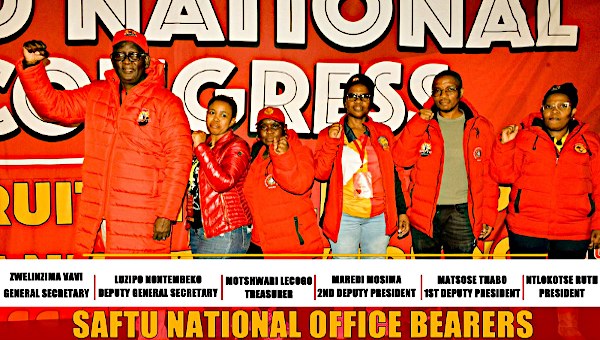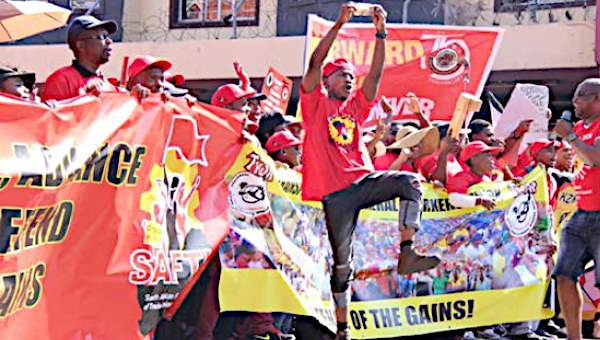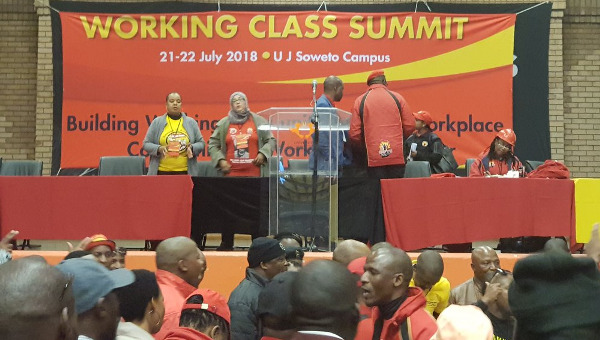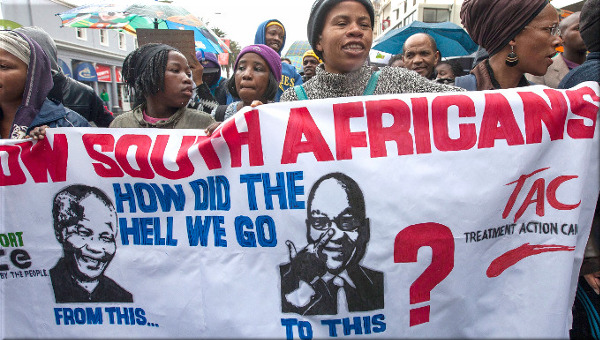South African President Jacob Zuma‘s budget speech delivered on 4 May 2016 was yet another missed opportunity to look the South African public in the eye and be frank about the challenges our country is facing. This president and the government he leads are in a state of shocking denial about the worsening and unfolding crisis happening under their watch. They simply refuse to acknowledge the level of our people’s suffering.
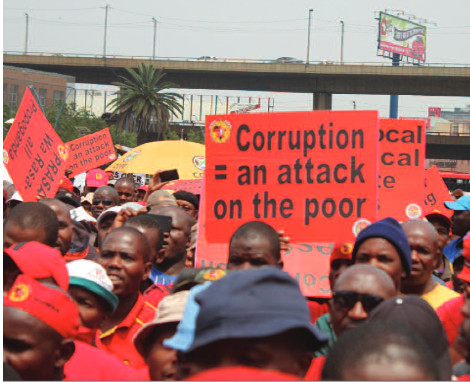
The president’s Budget Vote speech would make even the most committed loyalist ask themselves how the government can arrive at the conclusion that all is well and under control when it is clearly not. If the government took notice of its own information, its own statistics, and better still, if it stepped out into the real world, they would see that the world they live in is a very different one to that of our people. Even among loyalists, the denialism and spin doctoring are failing to convince. Among the people, the credibility of the government is at an all-time low.
It is simply no longer good enough to recite a list of delivery achievements, when the living conditions of the majority of our people continue to deteriorate.
Transforming the Economy?
The government has abandoned any notion of a transformation of the economy. Instead, they have become denialists. They allowed former President Thabo Mbeki to be a denialist on HIV/AIDS for years, and criticised him for it, and now they have become the prime denialists on questions of the economy.
President Zuma knows that he was brought to power as a saviour of the working class and the poor, especially in terms of the structural deficiencies of the economy, and to change the ownership patterns and wealth distribution arising from our national resources. He promised to place the needs of workers at the centre of his concerns. He pledged a people’s government, but he has delivered us into a worsening neoliberalism.
What he should have done was to restructure the economy and undermine the dominance of the mining/finance complex. He should have introduced a national beneficiation programme complemented by a socially and environmentally sound industrialization plan, and ended the dominance of white monopoly capital. He should have redistributed land, and made sure that we could feed our people, and export food to our neighbours.
At the time of his election, President Zuma had at his fingertips a range of creative and practical solutions to the challenges we face, many good and reliable people were developing alternatives to serve our people, such as the Industrial Policy Action Plan and elements of the New Growth Path, but instead he turned his back on them, and surrendered everything to maintaining the economic status quo.
At the level of politics he undermined the rule of law, hollowed out and domesticated organs of people’s power and the institutions that protect our democracy, all in order to save his neck from the 783 charges of money laundering, corruption and fraud.
Ignoring Their Own Reports
The budget speech took place within weeks of two devastating reports that have been delivered to our people. One was presented by Stats SA on “The Social Profile of Youth, 2009-2014.” The other report came from the Employment Equity Commission. Both of these reports were not mentioned by the President, the Deputy President or the Minister in the Presidency responsible for monitoring and evaluation.
Consider the findings of Statistician-General Pali Lehohla and the shocking revelation that black and African youth between 25 and 34 years of age are less skilled than their parents. Parents who grew up under apartheid! He said, “When parents are better equipped than their children, it’s a sign of regression.”
The report also revealed that young people aged 15 to 34 continue to constitute the bulk or two-thirds of the 5 million unemployed, using the government’s phoney “narrow” definition of unemployment. When using the more realistic definition (of expanded unemployment), this figure of youth out of work increases to about 6 million, or 75 per cent of over 8 million unemployed!
In the economically active 25-34 group, unemployment has been consistent between 2009 and 2014 dropping by a mere 0.6% to a catastrophic 40.4%. The government is not just failing our young people, but also the families they were hoping to support, and the communities where they live. Is it any wonder that many of our young people lose hope, and adopt negative practices to make ends meet? Why is our youth turning to harmful drug use such as nyaope? Why are they risking their lives by ignoring advice on HIV prevention? Why are they falling into violent patterns of behaviour? Without exaggeration, this is a time bomb waiting to explode.
We believe that when a government mismanages the economy in such a regressive manner and continues to rob the young generation of a future, it is time for change. Failing our future is frankly unforgiveable.
A second report, “The Employment Equity Report for 2014 and 2015” released last week, which was simply ignored by the leadership, shows the snail’s pace of progress in affirming the position of black people in top management. This is supposed to be an area where government boasts about progress, but even here, they have failed. If relatively high-profile transformation involving relatively small numbers of potential managers has failed, imagine what happens further down the ladder! For those workers who have employment, their terms and conditions, their prospects of advancement, their possibilities of being promoted are as bad as they were decades ago.
What the Employment Equity report fails to do (despite this being part of the mandate of the Employment Equity Act – see section 27 of the Act) is to report the evidence that wage inequality continues to grow, or to propose actions to reduce disproportionate income differentials, as required by the Act. In 2015 the top 5 per cent of earners earned 50 times that of the bottom 5 per cent of earners! This is up from 30 times in 2010.
Twenty-two years after the democratic breakthrough on 27 April 1994, mass unemployment, poverty, extreme inequality, racism and rampant corruption are the daily experiences of the majority of the working class.
Empty Promises Do Not Fill Empty Stomachs
The majority of workers still live in poverty despite working full-time. The legacy of the apartheid cheap labour system, which the president’s speech refers to, is still their daily reality. Yet the promise of a meaningful National Minimum Wage remains a distant reality, as business continues to hold government hostage in the negotiations. Workers face daily attacks on their living standards and job security. Jobs are becoming more and more precarious.
Outsourcing, labour broking, casualization and subcontracting are growing exponentially. Workers in informal employment are unsupported and unprotected. There is still no comprehensive social security system in place. In the manufacturing and mining sectors, whole industries like mining and steel are in danger of disappearing and throwing thousands more onto the streets. Up to 60,000 workers have been served with Section 189 notices under the LRA and are likely to join the growing queue of 8.3 million roaming the streets with little hope that they will get a job. Unions are being forced to negotiate lay-off schemes on a daily basis, and tens of thousands of workers have accepted voluntary severance packages because they see no alternative.
A Food Crisis for the Poor in a Land of Plenty
The year-on-year food price increase for January 2015 to January 2016 was 14.6 per cent. Some of the biggest increases have taken place in the most basic foods our people subsist on:
- Mealie meal, 21.2%
- Samp, 36.2%
- Cooking oil, 38.8%
- Potatoes, 120%
The biggest price increases are on items that workers and the poor spend a higher percentage of their incomes on than do the wealthy. It means that in real terms all those on fixed incomes have been made substantially poorer than they were a year ago. The truth is that 13 million people go to bed hungry every day, including many of the working poor. So much for progress and a better life for all.
The wage share of the GDP has been falling since 1991 when it was 57 per cent. It is now standing at well below 50 per cent. A South African Labour and Development Research Unit (SALDRU) report on what should constitute the poverty line in 2015 stated that it should be R1,319 per person or R5,276 for a household of four. Half of workers in 2014 earned less than R3,224 per month and half of all full timers (35 hours a week and above) earned less than R3,640. This means about 60 per cent of all workers live in poverty. This figure indicates a gross failure of government to address chronic exploitation and the continuing poverty that is faced by the working poor. Remember that this is a poverty line, the basic minimum to prevent starvation and chronic destitution. It is nowhere near what should be considered a living wage.
It is important to note that grants and pensions play a critical role in alleviating extreme forms of poverty, but the level they are currently fixed at is way below the SALDRU poverty line of R5,276 for a household of four. As an example, in 2016 pensioners and those on disability grants receive R1,520 per month, and the reality is that whole households depend on these grants. Child support grants are R350. We would challenge every single Member of Parliament and the Cabinet to try to survive on these meagre amounts. They are an insult to those who have sacrificed for our country, and who are barely surviving from one day to the next.
The president and other government leaders do not speak about the carnage of deepening poverty. The reason for this denialism is not so difficult to find. The government has bought into the neoliberal approach that in effect says that in times of crisis, the burden must be shifted onto the poor. The rich must be allowed to accumulate wealth, and the poor must wait until the economy can afford to give them a few crumbs off the table.
There are no people-centred ideas to redistribute wealth, to make the taxation system more progressive, to decisively stop wastage and corruption, to prevent capital flows out of the country, to address super-exploitation. This is a government that has run out of ideas to address poverty and the needs of the working class and the poor. The government has not just run out of ideas, it deliberately ignores the needs of our people in order to please those who currently control the wealth of our country. This is a government that serves the rich at the expense of the poor.
President in Cloud Cuckoo Land, not South Africa!
This is what President Zuma said in his speech in Parliament this week:
“The pro-poor government policies that we have implemented since 1994 continue to help improve the lives of workers and the poor.”
This is not a pro-poor government. If it was pro-poor there would not be deepening levels of poverty, unemployment and inequality. It is a pro-big business government that is implementing neoliberal and anti-poor economic policies. The president’s speech confirms that most of their efforts in recent months have been aimed at devising policies with the captains of industry. Despite numerous meetings with big business they have not had a single meeting with workers organizations. Why change anything when it serves the interests of the wealthy? President Zuma and his government cannot fool the people any more.
Contrary to what government plans and announces, GDP has declined over the last three years: from 2.9% in 2013 to 0.6% last year. In 2013, the Development Bank of South Africa said that we need a GDP growth rate of 10 per cent or more every year to meet the New Growth Path’s target of 5 million jobs by 2020. Instead of moving toward 10 per cent, the ANC government has taken the economy backwards. Growth rates of 0.6%, particularly in a growth path which entrenches existing economic patterns, are abysmally incapable of generating employment. Our economic and political system continues to be structured to allow those at the top to cream off the surplus, and plunder the national wealth.
Tax Havens for the Wealthy
Recently the news was full of the so-called “Panama Papers” exposing secret offshore bank accounts of extremely wealthy individuals and corporations showing where they hide their fortunes to avoid paying tax. A massive 11.5 million confidential documents were exposed on the internet.
Panama is a classic tax haven. Tax havens are countries which offer the wealthy very low tax levels, or even zero tax, on incomes, including company income, and they operate in secret. They provide a secret hiding place for the profits that are made from the sweat of the world’s workers. South Africa-based companies are frequent users. For example, research has shown that De Beers exported $2.83-billion like this between 2004 and 2012 to avoid paying tax. This was known to government, and they simply turned a blind eye to it. If evidence was needed to show that the government protects the wealthy at the expense of the poor then this is a damning example.
The 2015 Global Financial Integrity Report says that the amount of money in the world which escapes tax in these ways is $1.1-trillion. That’s R15.6-trillion. Just to make that picture clearer, SARS collected R830-billion in the last tax year. The amount of money owned by the wealthy that is escaping tax in the world is equivalent to more than 15 years of South Africa’s tax revenue. Figures for tax evasion and capital flight from South Africa suggest that our businesses are among the worst in the world when it comes to stripping the country of its resources.
Surely, preventing the wealthy from avoiding paying tax should be seen as a priority by the government, especially if the tax revenue is to be used to meet the needs of our people? This government however maintains a stony silence about this theft, and instead reassures the wealthy that it is not going to interrupt their theft any time soon.
Rather than harnessing our national wealth for development, the government continues to facilitate the ability of corporations and the ultra-rich to ship their wealth out of the country: we have had the recent announcement of a second tax amnesty (pardoning those who have illegally taken capital out of the country); massive amounts of dividends continue to flow offshore by SA companies who have been allowed to list in London New York etc, and SA companies continue to engage in an investment strike with close to R1.5-trillion sitting in their bank accounts.
Rhetoric Does Not Feed or Clothe the Poor,
Action Needed Now
In this budget speech, the government has completely dropped any reference to radical economic transformation. Instead it has puffed up its rhetoric, and at the same time diluted what was left in terms of redistribution. The sensibilities of the rating agencies are now considered more important than the levels of malnutrition in our communities.
As if the shocking spectacle of a president addressing workers on May Day and not making a single concrete proposal to tackle unemployment, poverty, unemployment and corruption was not bad enough, to then hear his Alliance partners extol the virtues of the ANC Government and why they must unite around the president was a public act of betrayal of all those who still have the hope that the ANC will return to its historical roots of being biased to the working class and the poor.
We currently have a discredited president, captured government institutions and agencies, a sycophantic political elite, including erstwhile self-proclaimed communists, and a people whose interests are not represented.
However, we need to avoid despair. There are democratic forces mobilising on the ground, rebuilding the confidence of working people in workplaces and in poor communities. Solidarity is developing between communities who are in revolt, and those who support their demands for service delivery.
There are links being strengthened between workers in the informal and formal sector, and public sector workers, and super exploited community workers. There are those who are ready to challenge divisiveness and not allow xenophobia or other negative sentiments to divide the working class. There are those who are prepared to work hard at finding real alternatives to neoliberalism, and to combine the intellectual capacity of labour-friendly institutions with the rich experience of workers to developing alternatives that serve our people. There are those who are ready to recruit the 7 million workers in the formal sector alone who are not unionised. There are those who are prepared to stand beside all those who are victims of sexism, racism and exploitation and say enough is enough.
The future lies with those who are doing this work, not those whose promises and empty slogans are meant to deceive and placate. Every day, in all corners of this beautiful country of ours, it is becoming clearer and clearer who is part of the problem, and who is part of the solution! Join with us in making change happen! •


